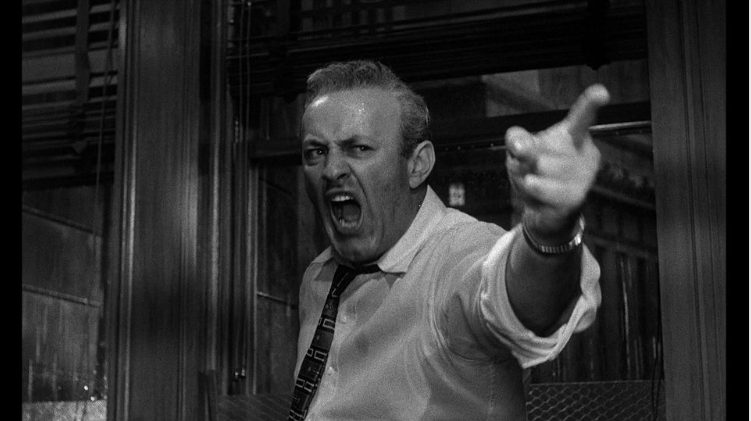
Izzy Lee argues that 12 Angry Men is a masterpiece relevant to our times
Trigger Warning: Mention of a criminal case,
‘One man is dead. The life of another is at stake. I urge you to deliberate honestly and thoughtfully.’, the Judge (played by Rudy Bond) proclaims with the intonation of one long hardened to the emotional influence of witness testimony. ‘If this is a reasonable doubt – then you must bring me a verdict of ‘not guilty’’. The 1957 film 12 Angry Men (based on the original screenplay written by Reginal Rose in 1954) pivots upon this question of morality, prejudice, discernment, and law. Shot in black and white and set almost entirely within the confines of an American jury deliberation room, the film details the considerations of twelve white, male members of a jury regarding the acquittal or conviction – effectively guaranteeing capital punishment – of a Puerto Rican teenager accused of the murder of his father.
In terms of pacing and structuring, the film is unique in that it plays out in real-time, not relying on regular cinematic devices such as flashbacks or time skips to make the narrative more concise. This makes the viewer the film’s thirteenth juror, allowing them to feel the frustrations and realisations of the cast as characters would experience them and as such allowing them to form their own judgements in conjunction with the men on screen.
The film is unique in the fact that it plays out in real time
Furthermore, the choice to impose an all-male, all white (with the exception of the accused) cast allows for the play to carry a considerably political subplot regarding racial stereotyping, inherent bias and the carrying of external judgements into the realm of law, best displayed when Juror 10 (played by Ed Begley) goes on a bigoted rant regarding those living in slums, despite another Juror admitting to living in one: ‘I’ve lived among them all my life. You can’t believe a word they say. You know that. I mean, they’re born liars.’
The directorial decision to have the other eleven jurors leave the table in sequence throughout the duration of this rant and face away from Juror 10 is significant, highlighting that presupposition should not be present anywhere within a court of law, visually deconstructing the juror’s view of a ‘them’ (immigrants) and ‘us’ (‘states-born’ Americans) and furthering the idea that the casual racism present in post-war America could no longer stand in an era increasingly dedicated to attaining and defending civil rights.
This political subtext that runs throughout the film has secured its relevance over sixty years later, especially in a climate so greatly divided over the issue of immigration as that displayed during the riots in August of this year in which anti-immigrant protests ensued following a circulation of false information regarding the ethnicity of the perpetrator of an attack on numerous young girls at a dance event.
12 Angry Men is a masterpiece in cinematography, characterisation and acting
Throughout the film, character development and acting performance happen in a masterfully natural manner, with multiple notable performances: a particular standout is Juror 8 (Henry Fonda), who acts as a moralistic devil’s advocate in a semantically loaded white suit, forcing the jurors to debate the accused’s innocence instead of simply reaching an immediate judgement of guilt. Another striking performance is that of Juror 3 (Lee J. Cobb), who adamantly insists the accused’s guilt despite no singular reason as to why, before it becomes apparent that his strained relationship with his own son has projected implicit judgements upon the case. ‘Rotten kids, you work your life out…!’ he yells, rips up a photo of his son and cries before admitting ‘…no. Not guilty. Not guilty.’
Verdict
12 Angry Men is a masterpiece in cinematography, characterisation and acting, relying on a minimal set in which every prop, down to a pair of glasses, gives substance to the narrative. Its lack of Technicolour may dissuade modern viewers (there is a 1997 remake in colour – nonetheless 1957’s original version remains the classic) but the depth of plot and character has every component of a good crime drama enacted in real time. We never find out if the accused is guilty, and as such this is not necessarily where our focus should lie. Rather, 12 Angry Men explores the concept of ‘reasonable doubt’ and the idea that unless there is concrete evidence, one should not be prejudged, for it is the responsibility of both the jurors and the viewer ‘to sit down and try and separate the facts from the fancy’.
Rating: 9/10
Read more from Film:

Comments